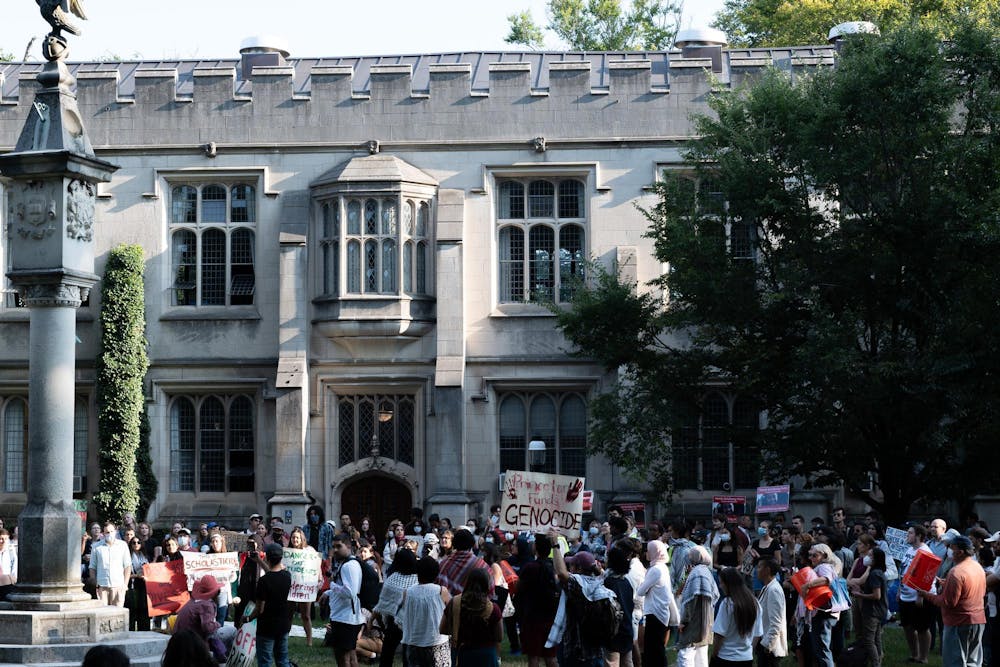The following is a guest contribution and reflects the author’s views alone. For information on how to submit a piece to the Opinion section, click here.
In May, President Eisgruber instructed the CPUC Resources Committee to consider the issue of divestment from Israel’s violations of Palestinian human rights and international law. This instruction came not “as a matter of practice,” as the email announcement claimed, but as a result of more than two decades of campus advocacy for Palestinian rights, seven months of steady demonstration against escalated genocide, a sit-in, a student-led hunger strike, and three weeks of protest, study, prayer, and movement building at the Popular University for Gaza.
A group of us — students and postdocs representing the movement for justice in Palestine — met with the Resources Committee in May. We described Israel’s ongoing campaign of genocide, occupation, and apartheid: the persistent violations of international law, the collective punishment of civilians, the direct targeting of journalists, and the destruction of numerous cultural sites and of every single university in Gaza.
We explained that divestment would be consistent with Princeton’s own policies and stated values and outlined what it could look like in practice. We listed examples of companies developing illegal settlements in occupied territories, providing weapons used to massacre unarmed Palestinians, and constructing the walls, checkpoints, and surveillance systems used to enforce apartheid. At the Committee’s request, we followed up with a detailed written proposal, which was endorsed by 32 campus organizations and submitted on June 19.
The Committee assured us that they were considering the proposal seriously and promised to get back to us soon. After receiving requests, the Committee is meant to “provide information on next steps in a timely manner, typically within two weeks.” But we waited for months as Israel continued its U.S.-backed genocide of Palestinians, with Princeton’s financial support.
At the CPUC meeting on Sept. 30, Resources Committee Chair Jay Groves announced the establishment of an online portal to solicit “community input” on the divestment proposal, which would remain open for 12 days. With respect to the mechanics of this process, Groves indicated that the Committee did not have specific plans for how it would consider the feedback it was soliciting, nor whether and how it would meet with interested groups.
Setting aside broader questions about the role of “consensus” in situations of social injustice, we write to express our concern with this post-hoc, poorly defined, and inadequately communicated process.
The Committee’s procedure for soliciting feedback all but guarantees a highly skewed sample of responses. The portal appeared on the Committee’s website without prior communication, for less than two weeks just before and during midterms. Although the Committee Chair took the liberty of placing an op-ed in this publication in May to announce the Committee’s intention to establish a “community input” process, he made no such announcement when the process in question ostensibly began. Nobody from the Committee nor the University administration proactively reached out to staff members, students, or faculty.

By contrast, Princeton has widely advertised its new website on protest policies — which include new rules against protesting in central locations on campus, flyering in most areas, erecting overnight structures, and drawing on the ground with chalk — by emailing the entire campus community, taking out advertisements in the ‘Prince’ and Town Topics, and placing “table tents” in every dining hall and campus cafe. If the University truly sought widespread community input on the divestment process, they might have advertised the portal with similar enthusiasm.
The precedent of divestment from the genocide in Darfur illustrates the expediency with which the University could divest from the genocide in Palestine. Concerns were brought to the Committee in fall 2005; in the spring of 2006, the Resources Committee recommended divestment to the Board of Trustees, which adopted a dissociation policy in June; PRINCO implemented the policy in summer 2006.
While Princeton stalls, the urgency and devastation in Gaza only increases. Since last October, Israel has dropped 75,000 metric tons of explosives on the 140 square mile strip of land crowded with 2.4 million inhabitants. The official death toll from the Gaza Ministry of Health has risen to 42,000 with over 97,000 wounded, many of them children. This count is only a record of those who died in, or were brought in dead to, hospitals, with verifiable accounts of their death being caused by Israeli attacks; if accounting for those trapped under rubble and for the destruction of hospitals and critical civilian infrastructure, the true death toll stands far higher. So far, the genocide has wiped 902 entire families off Gaza’s civil registry.
Meanwhile, Princeton has conjured new bureaucratic processes in which to mire divestment demands, and has manipulated its own rules to undermine advocacy for Palestinian rights. Instead of quickly withdrawing its investments in genocide, the University has criminalized peaceful student protest, introduced new restrictions on free expression, and investigated its own faculty.

We are prepared to engage with the Resources Committee in the best possible faith, as we have done thus far, but we fear that the Committee’s current scheme serves only to delay and confuse progress on an issue of extraordinary urgency. The Board of Trustees, after all, has “sole responsibility for all investment matters.” The Trustees must choose to act with moral clarity, as the moment requires and as the movement will inevitably continue to demand.
Givarra Azhar Abdullah is a member of the Class of 2027.
Sofia Menemenlis is a Ph.D. candidate in Atmospheric & Oceanic Sciences.
Hellen Wainaina is a Ph.D. candidate in English.
Jessica Ng is a postdoctoral research associate at the High Meadows Environmental Institute. All the authors are involved with the movement for Palestinian liberation and the campaign for divestment from Israeli apartheid. They can be reached at princetondivestnow[at]gmail.com.








